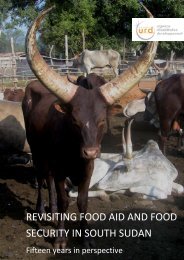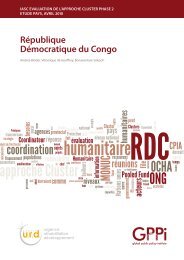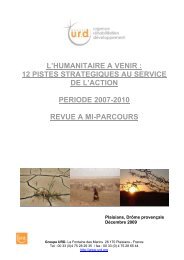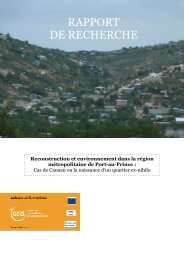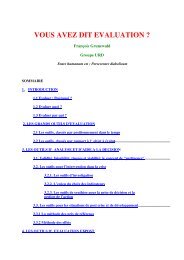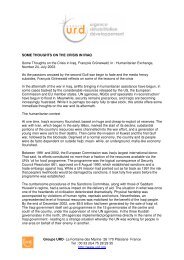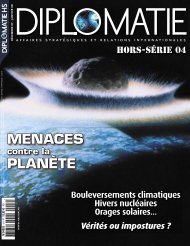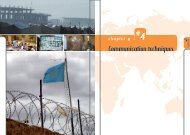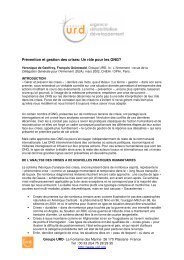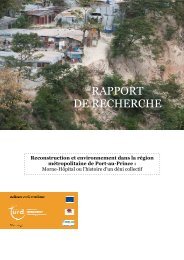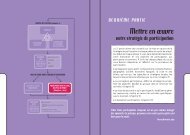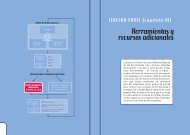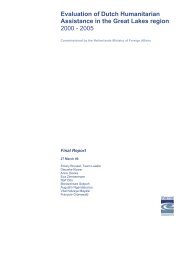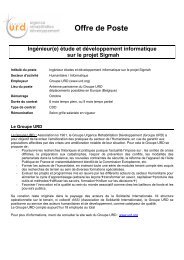Kabul Urban Survey - Groupe URD
Kabul Urban Survey - Groupe URD
Kabul Urban Survey - Groupe URD
You also want an ePaper? Increase the reach of your titles
YUMPU automatically turns print PDFs into web optimized ePapers that Google loves.
(AGCHO). In fact, overall urban and building knowledge is outdated. The engineers all<br />
studied in the Soviet bloc thirty years ago and their technical skills and urban understanding<br />
is no longer appropriate to the present situation. In the same way, the administrative<br />
framework has not evolved since 1978 and the Master Plan is becoming a stumbling block<br />
rather than providing the necessary guidelines. There is no updated Afghan database. All<br />
urban actors are working with different spatial references. There is no coordination on urban<br />
planning. Municipal law is either not applied or contested. KM does not have the necessary<br />
budget or capacity to manage the city.<br />
• Institutional misunderstandings<br />
According to a KM advisor, dissension exists between the main urban institutional<br />
authorities: <strong>Kabul</strong> Municipality and Ministry of <strong>Urban</strong> Development. The overt conflict<br />
between them is one of the main difficulties for <strong>Kabul</strong> city planning. KM has a special status<br />
like that of a Ministry and answers directly to the President. KM is not subordinate to the<br />
MoUD and KM wants to retain control of city planning decisions. Some aspects of the<br />
existing Municipal law in favour of municipality independence do not appear to be applied.<br />
Other aspects need to be changed or added to give KM real support in its role. However, due<br />
to the lack of urban skills and an inefficient tax collecting system, the MoUD is involved in<br />
resolving <strong>Kabul</strong>’s urban issues. The time spent by the two institutions in negotiating is by and<br />
large responsible for the delays in reconstructing the city.<br />
Other institutions involved in urban sector and <strong>Kabul</strong> in general are also outdated in their way<br />
of managing their urban responsibilities. For example AGCHO, in charge of cartography, has<br />
not drawn up current plans and delays handing over information. The cadastral department<br />
has no available plans either. The CAWSS, as water administration, is closely involved in<br />
water issues but is not in charge of solid waste collection. <strong>Urban</strong> management in <strong>Kabul</strong> is not<br />
coherent in institutional terms.<br />
7.1.3 Policies, programmes and projects<br />
<strong>Urban</strong> institutions have taken almost five years since the end of the conflict to become a<br />
priority. During this time, some programmes were assessed in different ways such as<br />
infrastructure rehabilitation, informal settlement analysis, development strategies and land<br />
tenure regularisation but very few projects were implemented. The different issues related to<br />
urban policy (such as rehabilitation, development, governance) are still in discussion. Today<br />
an urban framework exists but the urban priorities according to the different urban<br />
stakeholders are still in question. One of the main problems was the opposition between<br />
international aid (World Bank, UN-HABITAT) and Afghan points of view. Given the<br />
complexity of the different issues (illegal occupation, technical difficulties in supplying basic<br />
services in existing areas, population growth, urban management at a standstill), the Afghan<br />
authorities would like to develop a new town on the outskirts of <strong>Kabul</strong>. International aid<br />
stakeholders want help the city by upgrading existing areas, regardless of the illegal or<br />
informal status of urban occupation.<br />
A few pilot projects conducted by international organisations (UN-HABITAT, EC) will be<br />
followed by a more significant Rehabilitation Project for <strong>Kabul</strong> (KURP). The WB decided to<br />
fund this project two years ago but an agreement on how and where to implement it was only<br />
reached in July 2006. A technical survey was then carried out and project implementation will<br />
only start in 2007. Anyway, this project only concerns a few, very small areas in <strong>Kabul</strong>. Some<br />
international organisations participate in building water sanitation networks, but a coherent<br />
water sanitation policy requires greater state involvement.<br />
The other main urban issue is finding a solution to cope with population growth. Afghan<br />
authorities are intent on creating a new city north of <strong>Kabul</strong>. The GoA submitted a request to<br />
the Japanese Cooperation (JICA) to carry out the feasibility study but the WB is still advising<br />
Afghan authorities to move forwards more prudently by undertaking several steps of<br />
Page 73



